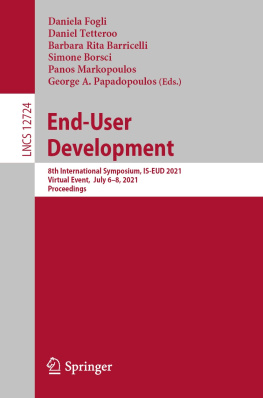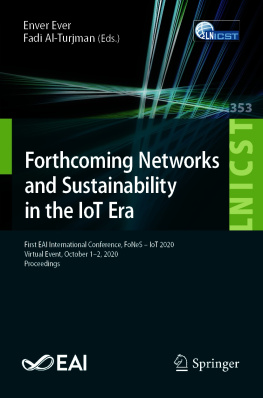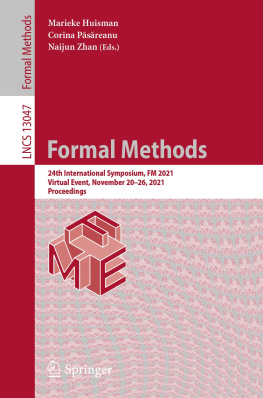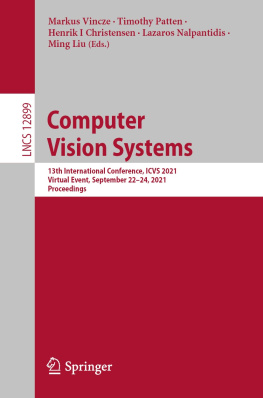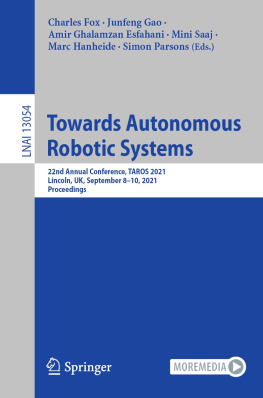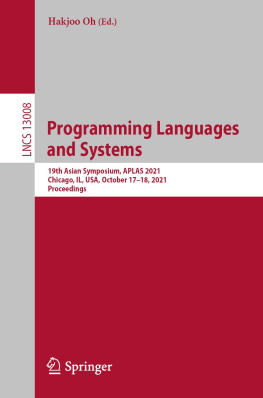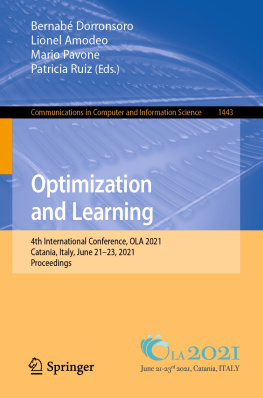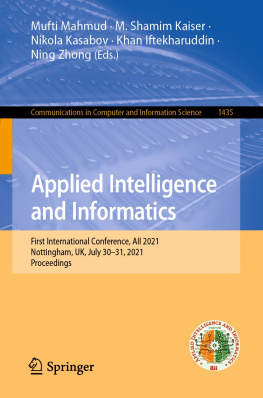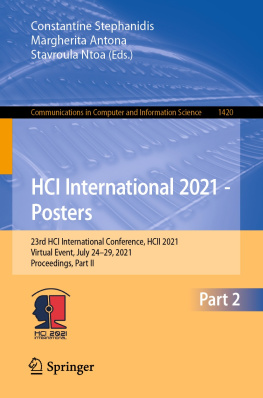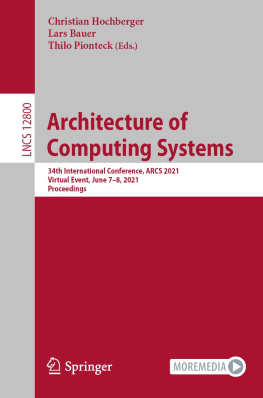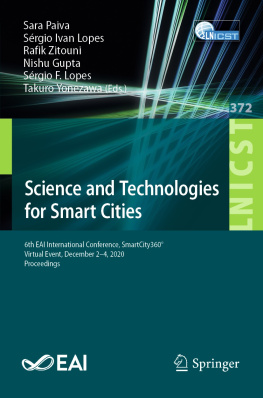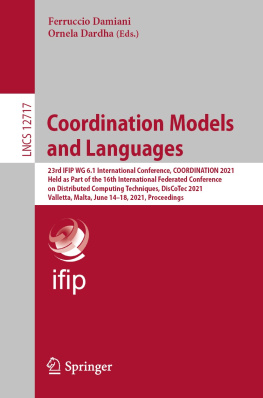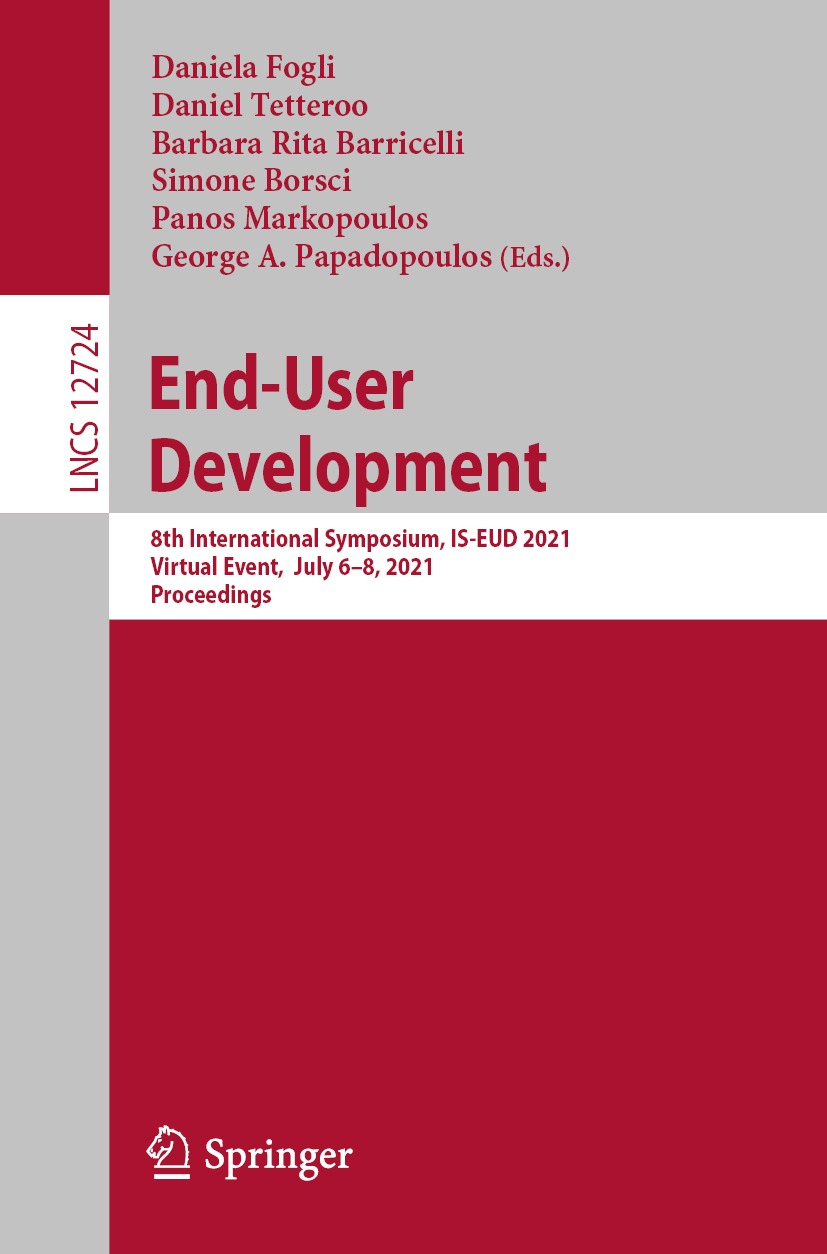Editors
Daniela Fogli
Ingegneria dell'Informazione, Univ degli Studi di Brescia, Brescia, Italy
Daniel Tetteroo
Eindhoven University of Technology, Eindhoven, The Netherlands
Barbara Rita Barricelli
University of Brescia, Brescia, Italy
Simone Borsci
University of Twente, Enschede, The Netherlands
Panos Markopoulos
Department of Industrial Design, Eindhoven University of Technology, Eindhoven, The Netherlands
George A. Papadopoulos
University of Cyprus, Nicosia, Cyprus
ISSN 0302-9743 e-ISSN 1611-3349
Lecture Notes in Computer Science Programming and Software Engineering
ISBN 978-3-030-79839-0 e-ISBN 978-3-030-79840-6
https://doi.org/10.1007/978-3-030-79840-6
Springer Nature Switzerland AG 2021
This work is subject to copyright. All rights are reserved by the Publisher, whether the whole or part of the material is concerned, specifically the rights of translation, reprinting, reuse of illustrations, recitation, broadcasting, reproduction on microfilms or in any other physical way, and transmission or information storage and retrieval, electronic adaptation, computer software, or by similar or dissimilar methodology now known or hereafter developed.
The use of general descriptive names, registered names, trademarks, service marks, etc. in this publication does not imply, even in the absence of a specific statement, that such names are exempt from the relevant protective laws and regulations and therefore free for general use.
The publisher, the authors and the editors are safe to assume that the advice and information in this book are believed to be true and accurate at the date of publication. Neither the publisher nor the authors or the editors give a warranty, expressed or implied, with respect to the material contained herein or for any errors or omissions that may have been made. The publisher remains neutral with regard to jurisdictional claims in published maps and institutional affiliations.
This Springer imprint is published by the registered company Springer Nature Switzerland AG
The registered company address is: Gewerbestrasse 11, 6330 Cham, Switzerland
Preface
Welcome to the proceedings of the 8th International Symposium on End-User Development (IS-EUD 2021), organized by the University of Cyprus and held virtually during July 68, 2021. End-user development (EUD) aims at empowering end users to develop and adapt systems at a level of complexity that is adequate to their expertise, practices, and skills. EUD may occur along the entire software lifecycle, with the purpose of making users able to participate in artifact development, not only during the design phase but also during actual use. Originally, EUD was conceived as a more general instance of end-user programming; thus, scholars proposed methods, techniques, and tools that allowed end users to modify or extend software artifacts, such as spreadsheets, web applications, video games, and mobile applications. In the so-called Internet of Things era, end-user development moved on to address the problem of defining and modifying the behavior of smart environments, including smart objects, pervasive displays, smart homes, smart cities, and so on. Therefore, the term end-user development has acquired a broader meaning, covering approaches, frameworks, and socio-technical environments that allow end users to express themselves in crafting digital artifacts that encompass both software and hardware technology. Recent research and technological trends like Artificial Intelligence (AI), big data, cyber-security, robotics, and Industry 4.0, have contributed to a renewed vision of end-user development, by providing tools and platforms that allow end users to harness the power of AI to create solutions involving computer vision, image processing, and conversational user interfaces, as well as solutions for smart environments. Such developments lower the threshold for creating AI solutions, and expand the programmer base for such solutions, by extending AI application both for professional and discretionary use.
IS-EUD is a bi-annual event for researchers and practitioners with an interdisciplinary approach to EUD, including Human-Computer Interaction, Software Engineering, Computer Supported Cooperative Work, Human-Work Interaction Design, and related areas.
The 2021 edition of IS-EUD focused on Democratizing AI Development, namely on EUD for AI-based systems, where end users are called on to become end-user developers of intelligent agents, digital twins, collaborative systems, and social robots. Theoretical and empirical work analyzing pros and cons of this new EUD wave, identifying requirements for end-user development of AI, and acceptance of related solutions were invited. In this edition, we discussed the adoption of EUD in new fields, the proposal of novel EUD paradigms, and the impact of AI-based EUD in terms of user acceptability and appropriation. Software infrastructures and eco-systems supporting the re-use of solutions and the emergence of meta-design practices were of particular interest, linking the challenges relating AI to topics central to the IS-EUD community.
IS-EUD 2021 collected research contributions as full papers, short papers, work-in-progress and doctoral consortium papers that presented
New, simple, and efficient environments for end-user development
New processes, methods, and techniques for empowering users to create, modify, and tailor digital artifacts
Case studies and design implications on challenges and practices of end-user development
Theoretical concepts and foundations for the field of end-user development
Methods and techniques for end-user development of AI-based devices
Approaches to end-user development based on conversational interfaces
Methods and tools to deal with cybersecurity through end-user development
The paper track received 26 submissions of full and short papers, of which we accepted 11 full papers and 4 short papers after a rigorous double-blind review process.
The program was opened by the keynote speaker Gerhard Fischer, Professor Emeritus of Computer Science at the University of Colorado Boulder, USA, who explored the relationship between specific AI approaches, meta-design, and cultures of participation, to illustrate different design strategies that will advance EUD not only as a technology but also as a cultural transformation.

